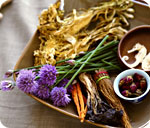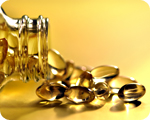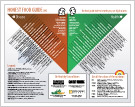
(Natural News) A recent study has found that foods with similar nutritional profiles can still influence the gut microbiome in different ways. This study, which was published in the journal Cell Host & Microbe, has found that the same exact food can have opposite effects in two different individuals and that the foods that belong to a similar family are more likely to have a comparable effect on the microbiome than foods with similar nutritional profiles.
In this study, the researchers recorded the food choices of 34 participants for 17 days. In order to analyze how each participant’s microbiome changes, shotgun metagenomic sequencing was performed on stool samples, which the team collected daily.
The researchers believed that this study would help them understand the links between certain nutrients and specific strains of gut microbes and determine why microbiomes differ between people. Instead, they found that foods that may share a similar nutritional profile don’t necessarily have the same effect on the gut microbiome. (Related: The health of your gut microbiome could predict your risk of heart disease, researchers find.)
Gut reactions are personal
The research team, using their very detailed approach, predicted changes in a person’s microbiome based on what they’d eaten in the days prior. However, these changes didn’t generalize well from one person to the next. They found 109 different foods had similar effects to the gut for at least two of the participants. However, they found only eight foods that had a relationship shared by more than two. Of those eight, five were opposite relationships. For example, one specific vegetable affected the bacteria of two people completely differently.
100% organic essential oil sets now available for your home and personal care, including Rosemary, Oregano, Eucalyptus, Tea Tree, Clary Sage and more, all 100% organic and laboratory tested for safety. A multitude of uses, from stress reduction to topical first aid. See the complete listing here, and help support this news site.
Furthermore, they couldn’t find any connection between these food-gut relations and the nutrients listed on the nutrition labels. Dan Knights, senior study author and professor at the University of Minnesota, said that this made sense because he and his team realized that gut microbes may be more interested in compounds that aren’t listed on the labels.
“We had to scratch our heads and come up with a new approach for measuring and comparing the different foods,” explained Dan Knights, senior author of the study.
Due to this stumbling block, the researchers developed a hierarchy of different foods, allowing them to identify related foods that they could share statistical data across. This made a huge difference, as they found that foods that were related such as kale and spinach, were more likely to have a similar effect on the microbiome.
“There are very clearly other sources of variation in the microbiome in addition to the foods that we eat,” said Knights.
A closer look at the gut is needed
Knights gives several recommendations for future research. Firstly, he believes that studies need to dig deep into the makeup of specific foods. Identifying every compound in a food item that gut microbes use to metabolize can help researchers understand the unique details of the gut ecosystem. Knights believes it will take a lot of work, but it’s possible.
Secondly, researchers need to look at huge data sets on diets and gut microbiome profiles. If studies have thousands of participants, as opposed to the several dozen in Knights’ study, trends can be spotted more easily even if many of the specific details are unique to individuals.
Future research into the gut microbiome may help people understand how clean, nutritious food can bring about a positive shift in a person’s health.
Sources include:
















